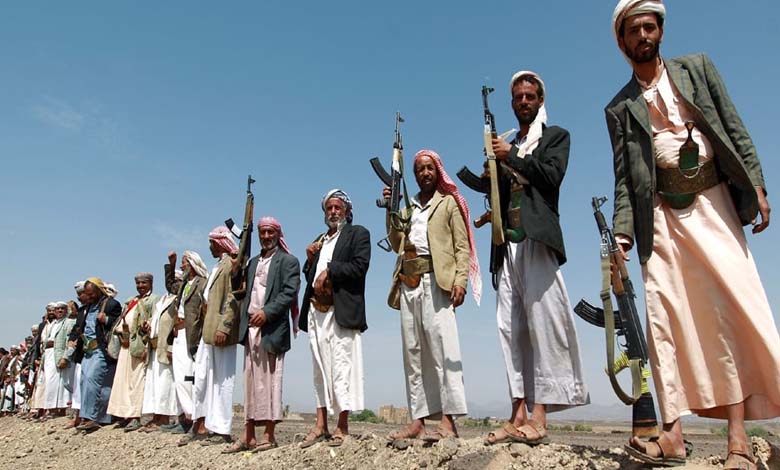Houthi and Al-Qaeda Shift Relationship from Covert Cooperation to Field Coordination

The relationship between Al-Qaeda in Yemen and the Houthi militia is witnessing a significant development, with the Houthis intervening militarily to ease the pressure imposed by forces loyal to the internationally recognized government on the organization in Shabwa Governorate, southern Yemen.
A statement by the “Shabwa Defense” forces reported two simultaneous attacks by the Houthi militia late last week, one ground and the other aerial using drones, at a time when joint units of the “Shabwa Defense” and the “Southern Giants Brigades” are imposing a tight siege on strategic locations of Al-Qaeda in the “Sha’ab Amuzyfa” area in the Lower Markhah District, western Shabwa Governorate, adjacent to the Houthi-controlled Al-Bayda Governorate.
The attacks aimed at breaking the siege on Al-Qaeda in a geographical area located between the areas controlled by the legitimate government and the Houthi militia reveal a rapid progression in the relationship between the two sides, reaching the level of military intervention and field coordination after many stages of rapprochement, the latest of which involved supplying Al-Qaeda with drones to target forces of the Southern Transitional Council loyal to the Yemeni government.
This development comes despite the recent death of the organization’s leader in Yemen, Khalid Batarfi, following the death years ago of Seif al-Adl’s son, who succeeded Ayman al-Zawahiri in leading Al-Qaeda and was considered one of the prominent supporters of the strategy of rapprochement with the Houthis, according to observers.
Researcher specializing in fundamentalist Islamic groups, Mohammed bin Faisal, points out that Seif al-Adl’s influence and control over Al-Qaeda in the Arabian Peninsula and its branch in Yemen remains strong today through other influential figures within the Shura Council of the organization, possessing money, weapons, and decision-making power. “This is what keeps the rapprochement and relationship with the Houthis ongoing and accelerating, in implementation of Iran’s agenda and strategy.”
He said that Al-Qaeda “has been pushed to the brink in its relationship with the Houthis, meaning it cannot easily break away and end the relationship, even if there is a genuine desire among some Al-Qaeda leaders, because the relationship has evolved to military and strategic levels, reaching financing with weapons, money, and explosives, and it is expected to go further in the coming period.”
Bin Faisal added that the recent Houthi attack in Shabwa to lift the siege on Al-Qaeda in western Shabwa is “the greatest realistic example of the relationship development between Al-Qaeda and the Houthis to beyond covert collaboration; it has become a direct military field alliance, clearly evident.”
-
Fabrication and Falsification of Facts: Collusion Between Al-Qaeda and Houthis to Undermine the United Arab Emirates
-
Wars and Crises: Yemen Welcomes Eid al-Adha with Ongoing Deterioration and an Exhausted Nation
Regarding some international reports about the new Al-Qaeda leader in Yemen, Saad al-Awlaki’s, desire to open a front against the Houthis contrary to the vision of his predecessor Batarfi, bin Faisal confirmed that this is “merely wishful thinking, but the reality of the organization is far from that due to Iran’s strategy that has bound and enabled the Houthis to control it.”
On his part, the official spokesperson of the “Southern Armed Forces,” Lieutenant Colonel Mohammed al-Naqib, sees significant dangers in such strategic alliances between “terrorist militias and terrorist organizations,” which will not be limited to the southern regions alone, even if the war is mainly on them, and may perhaps include threats to the security and stability of the entire region and international maritime navigation.
-
Yemen – How does Houthi’s collaboration with the Brotherhood and al-Qaeda threaten regional stability?
-
Kidnapping and extortion – This is how al-Qaeda used Houthi support to establish its foothold in Yemen
Al-Naqib said that the geographical location of southern Yemen places it in a region “full of international interests, close to global trade and energy lines, and therefore, Iran’s engineering of this two-headed terrorist entity aims to strike the region and these international interests.”
It is worth noting that the south is witnessing a surge in terrorist operations amid a clear and dangerous collusion on the security and stability of the south between the Houthi militia and their Brotherhood counterparts, and their ally Al-Qaeda.












